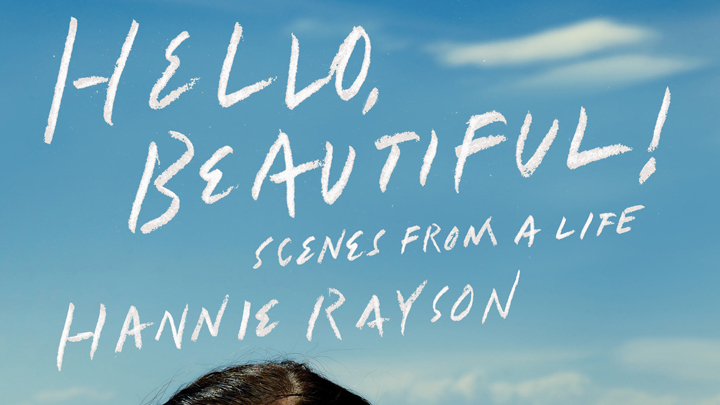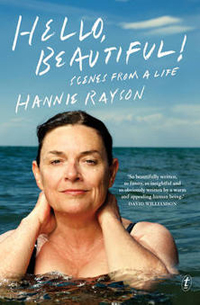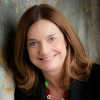Reading Readit: Hello, Beautiful! Scenes from a Life

Many thespians know Hannie Rayson as the author of one, or several, of their favourite plays, Inheritance, Two Brothers, The Swimming Club Hotel Sorrento (also a successful movie) and many others. Many of her works also appear on High School English curriculums. 
A personal favourite is Life After George about a man with two ex, and one present, wives who is totally unable to keep his eyes, and hands, off any pretty girl who comes his way. His wives have a use by date and they are replaced with their younger self. Such is the talent of this author that wives, and audiences, love George – he is written with such charm!
When I saw in a catalogue that Hannie was publishing a memoir, I welcomed the opportunity to learn more about an author whose work I admire. Someone who could make George a charming and loveable person, has to have interesting things to say. Thank you Text Publishing for my ARC.
In the prologue, Hannie says, “I am a playwright. I have spent thirty years pretending to be other people. I lie on the floor in my study and try to imagine I am someone else. It’s exhausting. Right now I am a dying man with drug resistant tuberculosis. Earlier this morning I was his angry daughter and after lunch I plan to be his Asian wife. Often I am everyone at the same time.
My imaginary people are always spitting the dummy. They cheat, they fight and they lie; they’re cruel and they betray each other. The more scandalously they behave, the better for all concerned. I develop an affection for most of my characters. Even the racists and the bigots.
… My plays are never about me. But for reasons I cannot explain, I have woken up and found myself interesting”.
With her strong opinions on many subjects, the Hannie Rayson we meet in this memoir is very interesting not only to herself, but to us. She writes in chapters, not necessarily chronological, which not only offer an often humourous insight into the woman and the playwright, but are great conversations starters. For example:
On graffiti – “… If you don’t like the aesthetics of graffiti and tagging it can fill you with terrible despair. I know that other people call it art. I experience it as white noise. Visual tinnitus. It is indifferent to the architecture on which it is imposed. It scorns urban form. It sneers at grace”. There is however one piece of graffiti which appeals to her, but that spoiler will wait until you read the book.
On dinner parties: “… people are suffering from performance anxiety at the prospect of entertaining their friends at home; the modern ‘fetishisation” of food has contributed to less conviviality rather than more. If only we were content to throw a few chops on the barbie and serve them up with a green salad, we’d see more of each other”. Despite feeling this way, Hannie admits she just cannot take her own advice.
Another chapter which particularly appealed to me is entitled “Love and Writing”, where she reminisces about going to romantic movies with her mother and “… I was sick with worry and pity for my mother. I thought this is all over for her. She’s married to my Dad”. With typical teenage narcissism, she pitied her mother for never walking barefoot in the park, having breakfast at Tiffany’s, or a farm in Africa. I have to admit that Hannie shared many traits with yours truly.
Many authors will relate to Hannie’s desktop meeting with a play’s characters: “I’ve gathered you here today to tell you that despite my best efforts you have all wilfully refused to contribute to any sort of plot. It’s clear that you are not remotely interested in illuminating the human condition. Frankly you will never amount to anything and as of today, I’m shutting down operations in this plant”.
I was sorry to finish this book. It is an easy, entertaining read, written in a chatty, friendly, open style. I thoroughly enjoyed this look inside the life of a playwright I admire; Hello Beautiful.
About the Author
Hannie Rayson was born in Melbourne, Victoria and graduated from the University of Melbourne and the Victorian College of Arts. She has worked as a freelance journalist and editor in addition to her primary career as playwright and screenwriter. Rayson was the co-founder of the community theatre group, Theatreworks in Melbourne’s eastern suburb of St. Kilda, working there for four years while writing. Rayson has been writer-in-residence at Geelong’s Mill Theatre, Playbox Theatre, La Trobe University (which has awarded her an Honorary Doctorate of Letters), and Monash University.
Recognised as one of Australia’s most significant playwrights, Rayson’s first major success was Hotel Sorrento, which won several prizes including the Australian Writers’ Guild Award. The play has become an Australian classic, regularly performed by regional theatre groups, and appearing in university courses and on the high school syllabus. The film of the play, directed by Richard Franklin, won an AFI Award for best screenplay (Peter Fitzpatrick and Franklin). In 2010, the play’s London debut won critical acclaim.
Her more recent works are Falling from Grace, Scenes from a Separation (written with Andrew Bovell), Competitive Tenderness, Two Brothers, Life After George, Inheritance, The Glass Soldier and The Swimming Club.
Rayson was the joint recipient of the Sidney Myer Performing Arts Award in 1996 and has won Victorian and NSW Premier’s Literary Awards and three prestigious Helpmann awards. She is the only playwright ever to be nominated for the Miles Franklin Award.
Available for $25.25 via Booktopia
————————————————————–
Love books? Sign up for our Starts at 60 Bookclub, coming soon by filling out the form below. Receive deals, giveaways and updates on the books other over 60s are enjoying.









 Proudly Australian owned and operated
Proudly Australian owned and operated